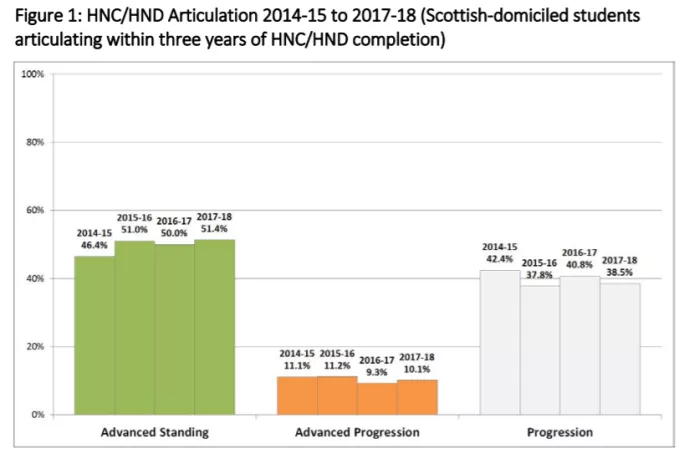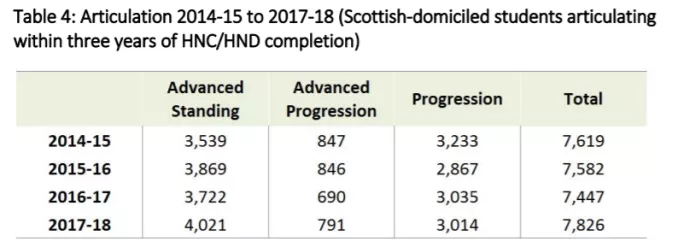- Home
- Only half of uni entrants from college get full credit for qualifications
Only half of uni entrants from college get full credit for qualifications

Just over half of students entering university after gaining a Higher National Certificate or a Higher National Diploma at college gain full credit for those qualifications.
Through a mechanism knows as “articulation” in Scotland, those with an HND should be able to move straight into the third year of a four-year degree at a Scottish university, while those with an HNC should be able to move into the second year if they are given full credit for their prior learning. However, in the past, the majority of students has not been given full credit, or “advanced standing” - and instead get only “advanced progression” (or partial credit), or no credit at all.
Read more: Almost half of Scotland’s colleges ‘very good’ for student outcomes
Background: Co-operation between colleges, schools and universities essential, says Scotland’s education secretary
Opinion: ‘Scotland’s colleges put the country ahead on access to HE’
Students from the most deprived backgrounds
According to a report published by the Scottish Funding Council today, in 2017-18, many students still failed to gain full credit for their prior studies. A total of 51.4 per cent of students in 2017-18 gained advanced standing for their HNC/HND - 4,021 out of 7,826. That figure was slightly higher for those with an HND, where 64.3 per cent were given full credit when they entered university. This was the case for only a third of those with an HNC.

According to the figures from the new, revised National Articulation Database (NAD), crucially, HNC/HND articulating students accounted for over a quarter of all students beginning a first degree course at a Scottish university that year (26.1 per cent) - but 41.8 per cent of first degree entrants from the most deprived SIMD quintile arrived via the HNC/HND college route.
‘Not feeder institutions’
Writing on tes.com last week, Scotland’s commissioner for fair access Peter Scott said colleges had “their own unassailable place in the mainstream of higher education, currently enrolling a third of all students”. “Understandably, colleges are not always happy to see themselves as feeder institutions for universities,” he wrote. “Rightly, they insist that the higher education they offer - especially HNC/Ds - are free-standing programmes in their own right, understood and valued by employers. They are not designed to be preparatory courses for degree-level study.”
He added some universities for their part “do not make always make it easy for college students who want to transfer, although some of the ‘post-1992’ universities and universities with roots in technological education like Strathclyde and Heriot-Watt are honourable exceptions”.
“A range of arguments are used to justify restricting the credit transferring students receive, and the standard pattern is for HND students to be admitted to the second year - in effect, ‘losing’ a year, which prolongs their studies and costs them, and the taxpayers, more money. Whoever is to blame and despite efforts to improve the situation by establishing a National Articulation Forum, articulation between colleges and universities is still too ‘sticky’.”

More opportunities
Professor Andrea Nolan, convenor of Universities Scotland, said the figures showed there were more opportunities than ever before for college students who want to go on to do a degree at university through the fastest route possible.
“In the last year alone, an extra 299 students with Higher Nationals got full credit for their qualification and started direct into the second or third year at university,” she said. “That’s an increase of eight percentage points in just one year and takes the total number of students entering university this way to over 4,000.”
She added: “Students doing HNDs now have a very strong prospect of getting full or partial credit for their qualifications if they go onto university. Of those students now in university, having articulated from college, 64 per cent received full credit and started direct in the third year of their degree, and a total of 82 per cent received full or partial credit.
“It takes a lot of work to get these pathways between college and university working well for students as Higher Nationals and degrees weren’t designed to go together. The subject fit has to be right and the support has to be there to help the student make the transition between what can be very different learning environments. There’s some exciting examples of this working really well but it’s important that the ambition to do more doesn’t mean a compromise in doing it well.”
‘Encouraging aspects’
Shona Struthers, chief executive of Colleges Scotland, said colleges improved “life opportunities for people from lower socio-economic backgrounds by significantly contributing to fairer access, and the sector can be especially proud that almost 42 per cent of first degree entrants from the most deprived SIMD quintile (MD20) arrived via the college route”.
“It is also encouraging to see an increase in articulation by students with black and minority ethnic backgrounds, as well as those who are care-experienced and disabled. There is more to do on articulation, but the work currently being done on the implementation of the 16-24 Learner Journey Review will target further improvements in fairer access and diversity in Scotland’s tertiary education system.”
‘Quality and equality’
FE, HE and science minister Richard Lochhead said: “I am pleased to see more students entering university having gained a qualification at college, with today’s figures showing nearly 2,000 full-time first degree entrants coming from the most deprived areas in 2017-18. This is testament to the role that colleges play in widening access and shows that quality and equality continue to lie at the heart of the college sector. I welcome today’s report and commend our colleges and universities for increasingly working well together for the benefit of Scotland’s students, particularly those from more disadvantaged backgrounds.”
Karen Watt, chief executive of the Scottish Funding Council, said articulation was “one of the increasingly varied options offered by Scotland’s colleges and universities to improve the learner journey”. “There is more to be done to understand how it can be made to work even better but it is really encouraging to see the contribution it already makes to diversity and fairer access.”
Keep reading for just £1 per month
You've reached your limit of free articles this month. Subscribe for £1 per month for three months and get:
- Unlimited access to all Tes magazine content
- Exclusive subscriber-only stories
- Award-winning email newsletters



